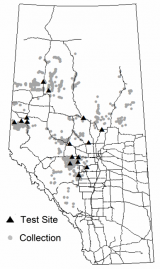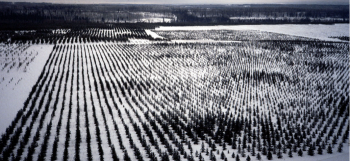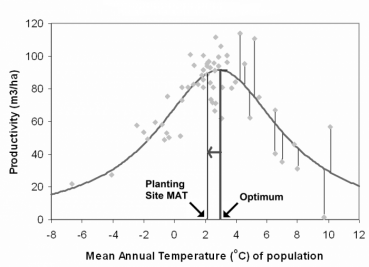4. Genetic testing with provenance trials

Provenance trials are a special type of plantation experiment that helps us understand how trees are adapted to different environmental conditions through genetic adaptation or phenotypic plasticity. Provenance means “origin” and refers to a population of trees that come from a particular location. To establish a provenance trial series, seeds are collected throughout an area of interest. This can be the entire species range or an administrative region as on the figure to the right. Then, the seedlings from all collection locations are planted together in a systematic experimental design on one or preferably multiple sites.

In the photo below, seedlings from the different source location were planted in row plots and you can quite easily see how they differ in performance. The sources that grow best can be considered best adapted to the planting site conditions, and those are the sources that we prefer for reforestation on sites that are similar to the test environment. As you can imagine, provenance testing is very expensive long-term research, and comprehensive trial series are only possible for the most valuable forest tree species in Alberta: white spruce, black spruce, lodgepole pine, tamarack, and aspen.

Data from provenance trials can be analyzed to understand how species adapt to environmental conditions in a general way: do we have a fine genetic subdivision with many different provenances that are specialists to their particular niche, or is the species genetically undifferentiated? Do provenances differ in their phenotypic plasticity? The data can further reveal non-optimal adaptation of natural populations. For example, the figure to the right suggests that provenances that come from slightly warmer locations (3°C) generally perform better than provenances that come from locations that match the planting site environment (2°C). This type of information can be used to develop general seed transfer guidelines for reforestation that help to improve productivity of our forests.